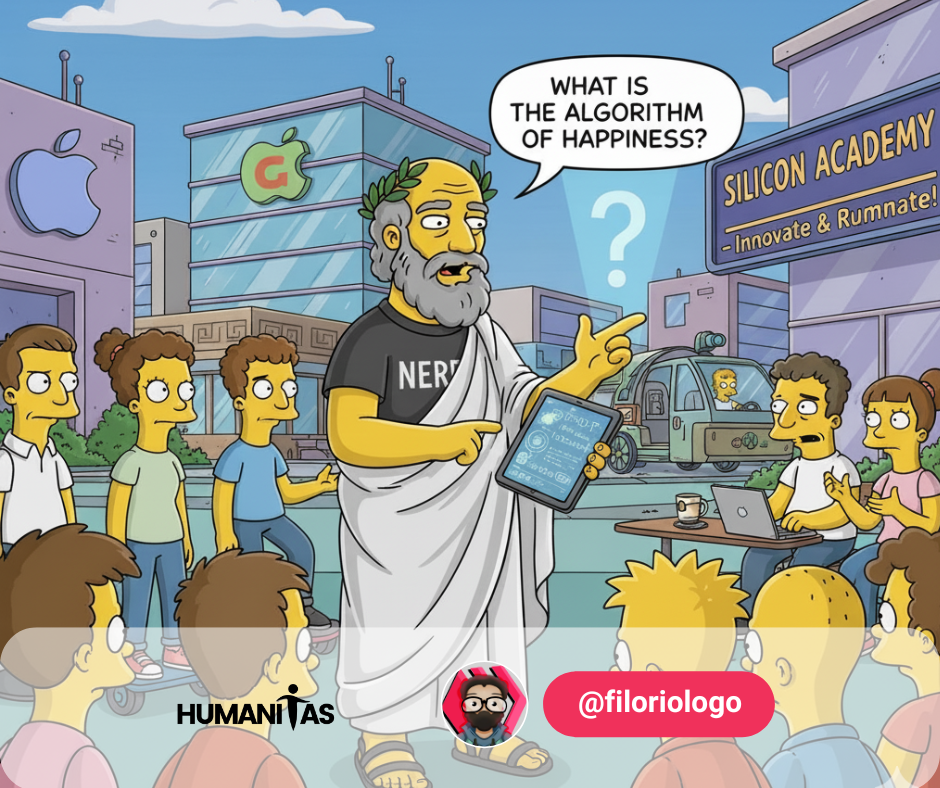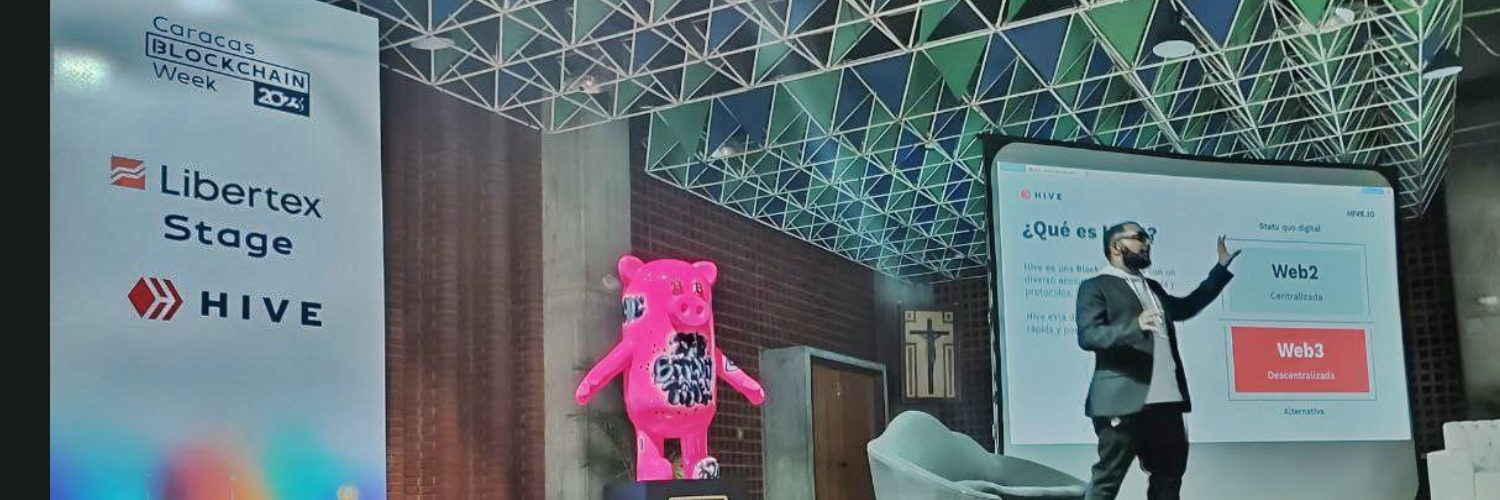The third topic of the initiative proposed by the community poses a very interesting question: “What would Socrates think of life in the 21st century?” This question gives me a lot to think about, and I would like to share my thoughts. Despite my affinity and interest in ancient philosophy, I would like to say that I am far from considering myself an expert on the subject, although I have read extensively on ancient Greek philosophy, so I believe I can offer a reasonably sensible and somewhat accurate approximation.

Image created with AI and edited in Canva
Socrates was considered the wisest man in Athens, not because he boasted about knowing this or that, but precisely the opposite, because he did not claim to know when he did not know, and it was the Oracle of Delphi himself who said that Socrates was the wisest, and the words of the god were wise words.
In this epistemological sense of approaching Socrates, it must be said that his first conflict with the 21st century would lie in the confusion of information with knowledge. I think he would be amazed at the way we have access to information, but he would be clear enough not to confuse information with the building of wisdom, and he would have an unspeakable need to talk to people with the greatest possible maieutic spirit.
I think I would question the need to have so much information, and I would understand that an overabundance of data can give the impression of knowledge, an impression that would be completely false and, today more than ever, would lead me to say something like, “I only know that I know nothing.” Although, strictly speaking, Socrates never actually said that. He would also say, or perhaps wonder, about the usefulness of so much information if we apparently do not know how to live well, and understand living well in the sense of living with virtue, living with and for the logos.
If there is one thing to keep in mind, it is that for the ancient Greek philosopher, there is a harmony between thinking and doing; one could say that ancient man measured the strength of his argument with his life. In that sense, Socrates, both in his time and if he lived in our time, would be a truly strange character.
Only knowledge has real transformative power, and it is not something that is acquired through mere exposure to data, and this could be considered a lesson from Socrates for the 21st century. Understanding that data is useless if it is not discerned, discussed, explored, and understood, and even more so if there is no transformation within us, in the words of Gadamer, to become a cultured man (person).
Translated with DeepL.com (free version)
VERSIÓN EN ESPAÑOL
VERSIÓN EN ESPAÑOL (click aquí!)
# Sócrates en el siglo XXI El tercer tópico de la [iniciativa](https://peakd.com/hive-186119/@eudemo/una-invitacion-a-pensar-lo-humano-desde-entornos-digitales-esp-eng) propuesta por la comunidad nos propone una pregunta muy interesante: “¿Qué pensaría Sócrates de la vida del siglo XXI?” cuestión que me hace pensar mucho y me gustaría compartir mis pensamientos. A pesar de mi afinidad e inteŕes por la filosofía antigua me gustaría decir que estoy lejos de considerarme algo como experto en el tema, aunque si algo he leído mucho son textos de la filosofía de la antigua Grecia, por lo que creo poder proponer una aproximación con cierta sensatez y algo de puntería.  Sócrates era considerado como el más sabio de Atenas y no precisamente porque se jactaba de saber esto o aquello, sino por precisamente lo contrario, porque no decía que sabía cuando no sabía, y es el mismísimo oráculo de Delfos quien dice que Sócrates es el más sabio y las palabras del dios eran palabras sabias. En este sentido epistemológico de acercarse a Sócrates habría que decir que su primer conflicto con el siglo XXI radicaría en la confusión de información con el saber. Creo que estaría maravillado con el modo de tener acceso a información, pero estaría lo suficientemente claro como para no confundir información con la edificación de sabiduría y tendría la indecible necesidad de conversar con las personas con el mayor espíritu mayéutico posible. Me parece que llegaría a cuestionar la necesidad de tener tanta información, y entendería que la sobre-abundancia de datos puede dar la sensación de conocimiento., sensación que sería algo totalmente falso y hoy más que nunca afirmará algo como “solo sé que no sé nada.” Aunque en estricto sentido, así textualmente Sócrates jamás dijo esa frase. También diriá o quizá se preguntaría por la utilidad de tanta información si al parecer no sabemos como vivir bien, y entiéndase con vivir bien en el sentido de vivir con virtud, vivir con y para el logos. Si hay algo que hay que tener en cuenta es que para el filósofo de Grecia antigua es que hay una consonancia entre el pensar y el hacer, del hombre antiguo habría que decir que mide la fuerza de su argumento con su vida. En ese sentido, Socrátes tanto en su tiempo como si viviese en nuestro tiempo sería un tipo realmente extraño. Solo el conocimiento tiene una fuerza transformadora real, y no es algo que se adquiere con la mera exposición de los datos y esto podría ser considerado como una enseñanza de Sócrates para el siglo XXI. Entender que los datos no sirven de nada si no se disciernen, dialogan, profundizan, entienden, y mucho menos si no hay en nosotros una transformación en palabras de Gadamer, poder llegar a ser un hombre (persona) culta.
*** *Si deseas apoyar mi trabajo acá puedes enviar un tip* *If you wish to support my work here you can send a tip.* *** - Bitcoin *Lightning Network*: filoriologo@sats.v4v.app - Bitcoin: 1Sarz4FYPMDGmEUL8DsAQYHKZSVazAaFk - BINANCE ID: 4072493  | [X](https://x.com/FiloRiologo?t=KwqSCxo_stO89jFXp1QBoQ&s=09) | [Instagram](https://www.instagram.com/filoriologo?igsh=cW9nYm9jN3V4aGky) | [Medium](https://medium.com/@filoriologo) |[Telegram](t.me/filoriologo) | [LinkedIn](https://www.linkedin.com/in/cesar-díaz-885a0a183/) | [INLEO](https://inleo.io/profile/filoriologo/blog) |